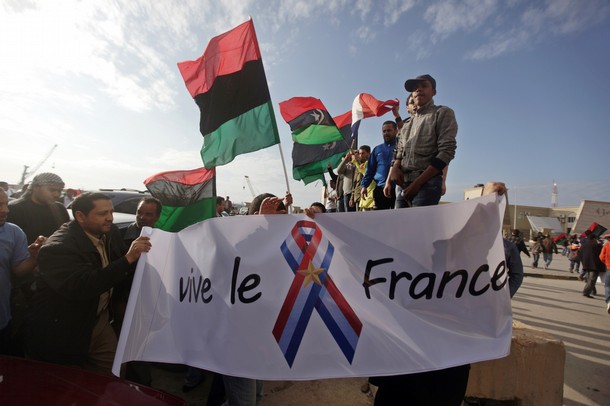
From Elisabeth Bumiller, the New York Times: [S]omething has happened on the bombing runs over Libya. France played a major role in this war, winning grudging respect from a Pentagon that has long looked down on many European militaries. Although Americans led the way in knocking out Col. Muammar el-Qaddafi’s air defenses with volley after volley of Tomahawk missiles, French warplanes flew the first raid into Libya and, along with the British, have flown the bulk of the airstrike missions.
“It’s a very strong lead example to the rest of the alliance in taking charge of this mission,” a top American military official said Friday. Despite his words of admiration for Paris, the official asked for anonymity because of what he described as extreme sensitivity within the NATO alliance about the role of each country in the war.
Sensitivity is putting it mildly. The American military has been in the unusual position of at least publicly taking a back seat in Libya, and strains have been rampant. The Pentagon never wanted to get into the war in the first place and felt dragged in by the exuberance of President Nicolas Sarkozy of France and a number of White House advisers. American military officials then grumbled that they had to unleash an initial shock-and-awe bombing campaign to destroy Colonel Qaddafi’s air defenses so that it was safe for the Europeans to fly their strike missions.
Since March, the United States has continued to fly critical refueling and surveillance flights, but has been obsessive about stepping out of the way and letting NATO, and to a large degree France, take the lead. So although France is admired in important quarters at the Pentagon, the building is still getting used to a strange new relationship.
“This is a different animal than we’ve been traditionally involved with,” said another top military official, referring to the Pentagon’s role within NATO in the last five months.
The Pentagon right now has “a love-hate feeling” about France, said Heather A. Conley, a European specialist at the Center for Strategic and International Studies, a Washington research institution. The “love” is appreciation for France’s contribution, she said, but the “hate,” or frustration, is the logistical confusion that occurred in the early days of the war, when the United States was trying to lead from behind and no one seemed to be in charge. “In this new model, everybody has to make important adjustments,” Ms. Conley said.
For now, the French are eager to highlight their contributions to the war, which over all are third behind the Americans and the British. According to the French military, France has flown about 4,500 flights, or sorties, in the five-month war, compared to more than 5,300 American sorties in roughly the same period. France has flown a third of all NATO strike sorties, or 2,700 flights in which ordnance was readied to be dropped. The French military did not provide their total number of actual strikes, which for the United States it is at least 262, but they said that their helicopters had destroyed 450 targets in Libya. (photo: Getty)
Image: getty%204%2020%2011%20Vive%20le%20France.jpg
